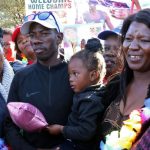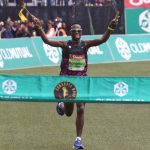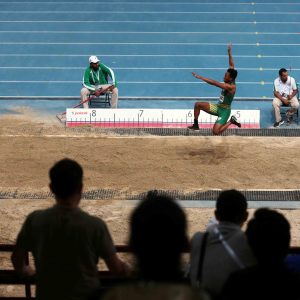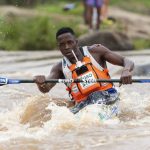What Bruce Fordyce means to the world of running
The record nine-time Comrades Marathon winner is road running royalty. His word when it comes to running is gospel. However, those words and achievements inspire runners differently.
Author:
12 June 2020
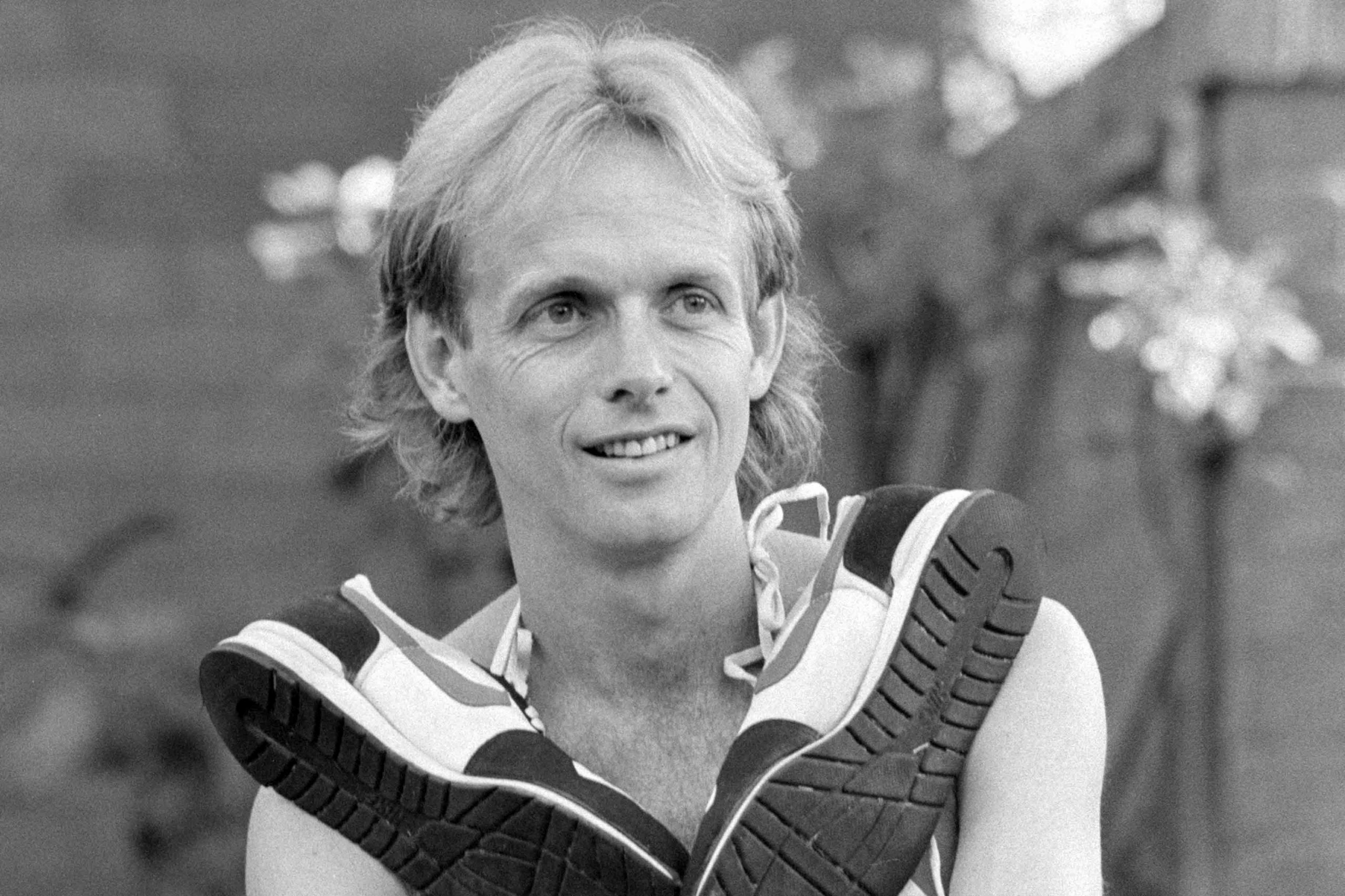
It is almost midnight and the staff at the Lupo Restaurant in Umhlanga, Durban are already placing the chairs on the tables. It’s way past closing time and all the patrons have long left. All except the six of us sitting on the table outside the restaurant. And they cannot tell us to leave.
How do they tell the Bruce Fordyce contingent to leave their restaurant? This, after all, is the man who had spent most of the night speaking to the waiter responsible for the table as though he was his long-lost friend. Having long brought the bill, which has already been paid, the waiter can but merely walk sheepishly near the table in the hope we realise the restaurant has to be closed.
Not that Fordyce is taking any notice. The Comrades Marathon king is clearly oblivious to the time and rattles on as he regales us with tales from his record-setting runs of the world-renowned KwaZulu-Natal ultra. Incredibly, while he has stories aplenty from Comrades as well as many about astronauts and the other high-profile people he has met, it is when he talks about the Park Run that his face lights up the most.
The mass participation, 5km social run gets Fordyce pretty emotional. And it has nothing to do with him being on his umpteenth glass of the red wine that has been flowing all night, or from the ones he had earlier on in the day at the hotel. Fordyce can handle his alcohol, all right.
“The Comrades Marathon was just for me and about me. Yes it is great that I inspired people. But I sometimes get amazed that I won it more than once,” he says almost dismissively of the race that has made him the revered man he is.
Park Run legacy
After all, not many are aware that he was partly responsible for bringing the Park Run to South Africa.
Mention the name Bruce Fordyce and the first thing that comes to mind is Comrades Marathon. He is inextricably linked to the Ultimate Human Race.
But it is the Park Run he would rather be remembered for. That is what gets Fordyce starry-eyed.
“That’s legacy stuff,” he says before taking a sip of his drink. “Do you know that at 8am tomorrow, 60 000 people will run or walk at about 330 venues around the country? That is three times bigger than Comrades. And then there are about 3 000 volunteers who get to those venues an hour before to prepare. It is massive.”
Related article:
It is Park Run’s impact that gives Fordyce goosebumps though.
“Park Run has changed many lives. And wherever I have run, I have had a person come to me, hug me and say, ‘Thank you for saving me. I’m now much healthier since I started doing Park Runs.’ This is what makes me happy. Sure, it was great winning all those Comrades [a record nine of them]. But [the] Park Run gives me immense pleasure.”
Fordyce was partly responsible for introducing the mass participation event to South Africa, having seen it done in London when he visited a friend there. And on this particular Friday night in Durban, he understandably takes serious offence on finding out that I have plans to run 21kms the following morning.
“Come on Chunky [a nickname he gave me for the weekend] you have to come do the Park Run tomorrow.”
He also tells one of the ladies at our table, who has been coughing incessantly, to make sure she is up for the run.
“Just have some more wine and take some antibiotics to get rid of that cough so you can run with us tomorrow,” he jokes.
I could not tell whether he was joking later on when we got back to the hotel though. As we got into the elevator, Fordyce asked me, “Where are you going, Chunky?”
It was as though he did not believe I could be staying in the same hotel as him and the others. While I politely responded, “I stay here too Bruce,” deep down I was seething, just as I did on many a Republic Day [31 May] back in the 80s.
Bruce Fordyce – the man, myth and legend
Bruce Fordyce. Mention that name and all manner of superlatives usually follow. The Comrades King. Mr Comrades. SA’s greatest ultra marathoner. My inspiration. My role model.
Road runners hang on his every word when it comes to how to train for that torturous +- 90km run up or down between KwaZulu-Natal’s two big cities, Durban and Pietermaritzburg. And many hustle for a selfie or an autograph should they be fortunate to be in his revered company.
And perhaps rightly so, for Fordyce’s achievements on the road are incredible. A nine times winner of the Comrades Marathon, he is also a former SA 100km record holder. I am a runner. A Comrades Marathon runner at that. But Bruce Fordyce is not my hero. Far from it.
This, after all, is a man who made a mockery of my favourite runner year after year. Growing up, I loved watching the Comrades Marathon and because of the state of our country in the 80s, I always backed a fellow black man. Hoseah Tjale was not only black but also a Mopedi like me and logic dictated I cheered for him.
It helped that he was a pedigreed runner with some good marathon and even ultra marathon victories to his name. Year after year I hoped he’d win, only for Fordyce to destroy that dream.
That he almost always came from the back to leave Tjale for dead – remember how Fordyce would tap a competitor on the shoulder and waved him goodbye as he went on to a victory? – made me dislike Bruce even more.
Related article:
And so it was with great delight that I watched Sam Tshabalala win the Comrades in 1989 “to end the Fordyce monopoly” of the great race.
I interviewed Tshabalala last year for an article to mark the 30th anniversary of him becoming the first black man to win the Comrades and the piece depicted him as having been responsible for “ending Fordyce’s reign”.
It was the first time in nine years that the race was not won by Fordyce. But that he did not win was not because Tshabalala beat him, but rather because he had not participated – Fordyce having opted instead to run the World 100km championship, where he set a South African record.
Fordyce was quick to point out the error of that article, the mistake coming about because Tshabalala had spoken of the joy of having “ended Bruce Fordyce’s domination”.
“It was Nick Bester who ended my reign,” he tweeted. I read that tweet to mean or say, “My reign as Comrades king was not ended by a black man but by a white man.”
Cue more dislike for Fordyce.
Motivated by Mr Comrades
Earlier in 2019 Fordyce had inadvertently irked me into running my best race ever. Being the former superstar runner he is, Fordyce is always sought for his views on races. And when the organisers of the 50th running of the Two Oceans Marathon found themselves forced to change the route so that the race went via the Ou Kaapse Weg instead of the Chapman’s Peak way because of a threat of riots, Fordyce shared his “expertise”.
“I would advise runners to add an extra 30 minutes to the time they’d planned to run because Ou Kaapse Weg is tough,” he said.
Panic abounded in the Mother City. At the Race Expo inside the Cape Town International Convention Centre, as I stood in line to collect my race pack, I could not help but notice a trio of runners – two ladies and a guy – who were hysterical.
“There’s no way I am going to be able to finish the race. Look, even Bruce Fordyce says Ou Kaapse is very tough. Why do they have to change the route at the last minute,” cried one, with the others nodding in agreement.
In ultra marathon running, what Bruce says is gospel. Period. He is that big. But I advised the ladies to not take heed of the “rubbish being spewed by the old man”. He is way past his sell-by-date, I offered. I realised later that it was the 80s me speaking to those ladies, my anger at Fordyce’s beating of Tjale at Comrades coming through.
Related article:
I had thoroughly prepared for the race and was confident of finishing the 56km run within four hours. But I got further encouragement all right. I had never run the Ou Kaapse Weg route, but I was not going to allow the comments or advice of “an old man” to stop me from earning the silver medal I’d narrowly missed out on the year before. 15 minutes out. And I did prove Bruce “wrong” by completing the race in 3 hours 52 minutes, to finish in the top 100 and earn that silver.
Comrades overachiever and underachiever
As we sit at Lupo, Fordyce – now aware of my super Two Oceans run – asks what my best Comrades time is.
“You are a Comrades underachiever, Chunky,” he says, while poking his fork into his salad plate for another bite. “You should have a Comrades silver medal,” the silver fork is now pointing at me. “The Two Oceans silver is much tougher than the Comrades one. Stop underachieving Chunky.”
Of course he could say that, being the Comrades overachiever he is. This, after all, is a guy who took to running the race as a means to try to heal a broken heart.
“I ran my first Comrades in 1977. Of course I knew about the race because we had a teacher who ran and we used to make our double Maths period bearable by asking him about Comrades. I first saw it on TV in 1976 and realised that ordinary guys ran it. I felt I could beat some of them. And in 1977 when my girlfriend dumped me, I decided to go run it, if only to take my mind off her.”
He had been running marathons since 1975. The Comrades Marathon bug bit and what followed stunned even the man himself, Fordyce winning the race nine times and finishing as a runner up once. He has 30 medals – 11 gold, five silver, seven Bill Rowan and seven bronze.
Which of those races was the most special?
“It is like asking a mother who is her favourite child,” he laughs, takes another sip of his wine and rolls his eyes as though searching for memories from those 30 runs.
“I had a very strong run in 1983, I won it by 15 minutes [over Gordon Shaw]. I remember my second telling me he cannot see anyone behind me. My fastest win was in 1986 [5:24:07]. There were also those great races with Alan Robb. He beat me in 1980 and I beat him in 1982. Johnny Halberstadt and Hoseah Tjale were also great competitors,” he says before appearing to trail away into the past, his eyes half closed.
And then the penny drops.
Related article:
“The baton with the mayor’s message at the finish,” he says with a twinkle in his eyes. “To get that baton is unbelievable. You might be the most introverted of people, but you will raise your hand up when you have that baton. Even Alan Robb came to life,” he laughs.
“My father was an army man. I had never hugged him. We always shook hands. But at the end of Comrades, I hugged him for the first time…”
Fordyce pauses, seemingly chokes at this memory and tilts his head back as if to stop the tears from falling. And then he laughs, “I wanted someone to hold on to.”
Comrade’s victory lap
Crossing the finishing line as a winner was also pretty special he remembers. “That last lap inside the stadium with the baton in your hand confirms you are the winner. But there is more to come. During our time they had this plastic Coca Cola tag at the finish and when you hit it with your chest it made this big popping sound. The feeling that enveloped me when I hit that tag and heard that sound was amazing.”
Fordyce heard that sound a record nine times, a feat that is unlikely to ever be beaten. Yet, there is a general feeling he should have made it 10 wins to make his Comrades royalty status all the more special.
“Of course I could have won it ten times. But the missed opportunities are not from races after my ninth win. That race when I came second behind Alan Robb, that’s when I lost the 10th title. I should have won in 1982. I knew after the ninth win in 1990 that I would never win Comrades again. I even told my sister who had come from London to watch the race that ‘this is my last win’. I was already very experienced and I knew I did not have it in me to win anymore. I was like Muhammad Ali who had been in the ring for too long and taken too many punches. That win was the slowest time [5:40:25] of all my victories.”
The Comrades enthusiasts will remember how Fordyce had struggled in that race and hardly looked like a potential winner only to take advantage of the incredible capitulation by Mark Page who had appeared to be cantering to victory.
He remembers that race, whose 30th anniversary was 31 May 2020, vividly.
“I was out of it. I had struggled and at one stage I was feeling nauseous. But late in the race, I’d made my way up and was among the front runners. I was running with Meshack Radebe and Jetman Msuthu was just ahead of us when we got to Little Polly’s. And then about 300m ahead of us, we saw Jetman walking off the road. He quit. I managed to pull away from Meshack and standing on the sidelines, Tommy Malone told me that I could catch up to Mark Page because he was walking.”
Indeed he caught up with Page and went on to register a highly unlikely victory. Tjale finished second yet again.
The missing medal
For all the glory of being Comrades King, Fordyce harbours great envy for a runner whose life has remained essentially unchanged and who lives in obscurity despite his magnificent achievement.
“I would swap a lot of my Comrades medals for Josiah Thugwane’s Olympic gold. That is, for me, the ultimate medal in road running.”
Why then is he, and not Thugwane, so revered?
“The thing is that in South Africa, there are some must-do events. If you are into canoeing and you have not done the Dusi, you are nothing. In road running, people only rate you when you have done Comrades.”
It is a mentality he hopes could change.
“Take Sonja Laxton for example. She has never run Comrades, but she is a renowned legend of South African road running. I wish runners cannot be pressured into thinking they have to do Comrades to be recognised. Look at the impact Park Run is making.”
Related article:
This much becomes evident on Saturday morning when we gather for the 5km run, with close on 500 runners – from primary school boys and girls through teens and adults to golden oldies – lining up.
Fordyce’s presence is acknowledged by the organisers and he is given the platform to say a few words of encouragement to the runners, many of whom are quick to pose for selfies and pictures with the legend.
An older man I am standing close to comments to his buddy that: “Bruce is looking really old though.”
The response: “That’s the effect of all those Comrades runs.”
Not that you could tell as Fordyce ran the 5km pretty well, swamped by starstruck joggers. I only see him after making the initial loop as I speed through the run to finish in a Personal Best 17 minutes for third place.
I’d beaten Fordyce. A win for my hero Hoseah Tjale, right? It was not me they were mobbing afterwards though as Fordyce took centre stage at the launch of the Discovery Run Series – sharing his expertise, signing autographs and posing for pictures with admirers.
A record nine Comrades wins gives you that. Although it appears he would rather be celebrated for the Park Run.

